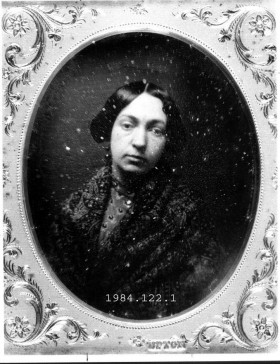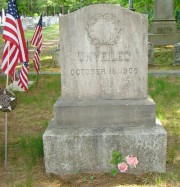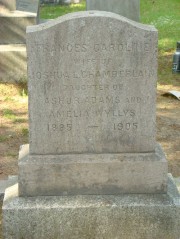Frances (Fanny) Caroline Adams Chamberlain (1825-1905) was a musician and the wife of Civil War General Joshua Lawrence Chamberlain. She was adopted as a small child by her father’s nephew, Reverend George Adams and his wife. He was minister of the First Parish Congregational Church in Brunswick.
Fanny, as she was called, was artistic and musically talented and often played the organ in the church. There she met Joshua Chamberlain, from Brewer, who was a student at Bowdoin College. Although they became engaged to marry in 1852 in his senior year, they went their separate ways for three years
Fanny journeyed south to Milledgeville, Georgia, where she taught voice at a girls’ school , gave private studies for the piano, and played the organ at the Presbyterian Church. During the same time, Joshua attended Bangor Theological Seminary, graduating in 1855, the year of their marriage on December 7. By then Joshua was a professor at Bowdoin teaching Greek and Logic and Natural Theology.
Although Fanny had five pregnancies, only their daughter Grace, called “Daisy”, born in 1856, and their son Harold Wyllys, born in 1858, survived. Their first son was premature and two daughters died in their first year .
In the beginning of their marriage, Fanny played the role of a young professor’s wife. In 1861, Bowdoin selected Joshua to be chair of modern languages. By then he had bought the one-story cape across from the college which is now the Joshua Lawrence Chamberlain Museum. Although the house was later moved to face Maine Street and raised to be two stories high, it was to be her home for the rest of her life.
The Civil War radically changed their lives. In 1862, Joshua, anxious to join the Union army, volunteered despite the college’s objections. His first assignment was as lieutenant colonel of the 20th Maine Volunteer Regiment. Fanny remained at home to raise their two small children. In the early summer of 1863, Fanny traveled to Washington, DC, hoping to obtain a pass to visit Joshua in the field but it was denied because the 20th Maine was experiencing a small pox epidemic.
She had reached New York City on her way home when she heard of the battle of Gettysburg where Joshua became well known for his success at Little Round Top. While she was in New York, she got caught up in the Draft Riots. She was sequestered in the St. Germaine Hotel on Fifth Avenue and Broadway while the army shot cannons into the park across the street. When it was finally over, she returned home to Maine.
In 1864 Joshua was wounded seriously at Petersburg and although she was expecting another child, Fanny rushed to be by his side in Annapolis, Maryland, and nursed him for three months. After he recovered, Fanny begged him not to go back to war but he was determined to remain until the end. Fanny gave birth to another daughter who also died in infancy.
In 1865 General Ulysses S. Grant selected Chamberlain, by now a brevet major general, to receive the surrender of General Robert E. Lee’s Army of Northern Virginia at Appomattox Court House.
Fanny and Joshua’s problems did not end with his return home. Their marriage became strained as neither partner fully appreciated what the other was going through . His successes in the war made him a hero and many visitors progressed through their home. In1867 he was elected governor of Maine serving four one-year terms. Because there was no governor’s residence in Augusta, Joshua commuted to Augusta from Brunswick. Fanny and Joshua even lived apart for almost a year until they reconciled in 1870.
In 1871, Bowdoin College chose Joshua as its president, a position he held for twelve years. At this time, the Chamberlains raised the first story of their house and built new rooms underneath including an elegant entrance hall, a library, and a formal parlor which Fanny enjoyed decorating. Some of the paintings on the walls were by Fanny herself. They entertained the students and other guests. Fanny continued with the piano and Joshua especially enjoyed playing his cello.
They both suffered health problems. Fanny sometimes accompanied Joshua to Philadelphia for hip operations. Fanny began to suffer serious eye problems which was very hard on her since she the “Unveiled” inscription on Fanny Chamberlain’s gravestone refers to her love of beauty and art. After he left Bowdoin, Joshua tried various private ventures until President McKinley finally appointed him Surveyor of the Port of Portland in 1900.
Meanwhile Fanny’s eyesight had deteriorated. In the summer of 1905, she fell at home and broke her hip. She was forced to her bed and died on October 18, 1905.
Fanny was buried in the Pine Grove Cemetery, Brunswick, with a special gravestone that bears the inscription, “Unveiled.” Her husband joined her nearly ten years later in 1914.
Contributed by Amanda Edmondson, Topsham, Maine, 2008.
Additional resources
Smith, Diane M. Fanny and Joshua: The Enigmatic Lives of Frances Caroline Adams and Joshua Lawrence Chamberlain. Gettysburg, PA. Thomas Publications. 1999.




